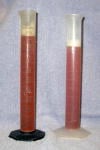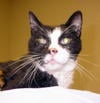 This is Toby with a blow-by oxygen tube in front of his face. Toby is 14 years old. As often happens, in the earlier stages of his disease a lot of his clinical signs were chalked up to "just getting older". When he began having difficulty breathing, his mom sought help. This is a lady who loves her cats and is committed to their care, and it was quite a shock to see Toby with a belly full of fluid, swollen limbs, and seriously thin. Part of this was his hair "filling in the gaps" early on, part of it was the gradual transition, and part of it was that "just getting older" thing.
This is Toby with a blow-by oxygen tube in front of his face. Toby is 14 years old. As often happens, in the earlier stages of his disease a lot of his clinical signs were chalked up to "just getting older". When he began having difficulty breathing, his mom sought help. This is a lady who loves her cats and is committed to their care, and it was quite a shock to see Toby with a belly full of fluid, swollen limbs, and seriously thin. Part of this was his hair "filling in the gaps" early on, part of it was the gradual transition, and part of it was that "just getting older" thing.
 Here’s why he was having trouble breathing. I’m sure it was a little difficult moving his diaphragm with that belly full of fluid, but having a chest full of fluid really made it hard. His lungs are compressed down to about one-fourth of the space they usually occupy. His heart cannot be seen here because it is obscured by the fluid around it. An ultrasound examination showed that the right side of his heart was stretched out of shape, weak and flabby. The inability of his heart to pump fluid forward was causing it to back up in the veins, and this back-pressure was causing the fluid to seep out of his veins and accumulate in his belly, chest and limbs. His other organs were also suffering from poor circulation.
Here’s why he was having trouble breathing. I’m sure it was a little difficult moving his diaphragm with that belly full of fluid, but having a chest full of fluid really made it hard. His lungs are compressed down to about one-fourth of the space they usually occupy. His heart cannot be seen here because it is obscured by the fluid around it. An ultrasound examination showed that the right side of his heart was stretched out of shape, weak and flabby. The inability of his heart to pump fluid forward was causing it to back up in the veins, and this back-pressure was causing the fluid to seep out of his veins and accumulate in his belly, chest and limbs. His other organs were also suffering from poor circulation.
 You can’t really wait for medicine to take care of this, so we stayed late last Friday. Thoracocentesis means sticking a needle (or in this case a flexible catheter tube) into the chest and draining off the fluid. This was only about half the fluid in the chest, but it was all we could get without undue stress and trauma. He was breathing much easier afterwards.
You can’t really wait for medicine to take care of this, so we stayed late last Friday. Thoracocentesis means sticking a needle (or in this case a flexible catheter tube) into the chest and draining off the fluid. This was only about half the fluid in the chest, but it was all we could get without undue stress and trauma. He was breathing much easier afterwards.
 The next step was support with diuretics to help with the fluid reduction (which also reduces the heart’s workload) and enalapril to further reduce the heart’s workload. He tolerated his medicine well, and has been eating well, but we aren’t getting optimistic yet. We may have to add more medicines to his program. After his first week, his legs aren’t swollen anymore, but his chest had refilled with fluid. There was a little less fluid than last week, and we were able to remove about twice as much this time.
The next step was support with diuretics to help with the fluid reduction (which also reduces the heart’s workload) and enalapril to further reduce the heart’s workload. He tolerated his medicine well, and has been eating well, but we aren’t getting optimistic yet. We may have to add more medicines to his program. After his first week, his legs aren’t swollen anymore, but his chest had refilled with fluid. There was a little less fluid than last week, and we were able to remove about twice as much this time.
 Toby is feeling halfway decent after the second round of drainage. It’s day by day now, and a consultation with a cardiologist. Yeah, he’s got a failing heart and he’s 14 years old, but we’re going to see if we can’t give him some more good days.
Toby is feeling halfway decent after the second round of drainage. It’s day by day now, and a consultation with a cardiologist. Yeah, he’s got a failing heart and he’s 14 years old, but we’re going to see if we can’t give him some more good days.


My dog, Billy, has the exact same situation as Toby. Billy is a 10-yr-old doxie.
Billy still eating well, but he’s lossing weight (muscle); hair won’t grow back on his chest after shaved for tapping; he still wants to play, but lack of strength; and the most important problem: breathing is becoming more difficult as days pass.
Is there any medication that can help??? Water pill (Lasix) is not much help.
Hello, Rebecca,
If Lasix alone is not helping, it is possible that a combination of drugs may. Other drugs like enalapril (or other A.C.E. inhibitors) can ease the workload of the failing heart.
Pimobendan is a newer (though more expensive) drug that also opens the blood vessels to ease the heart’s workload, while giving the heart muscle a little stimulus to contract more forcefully.
Thirty years ago, we put all congestive heart failure dogs on digoxin. This drug pushes the heart muscle to contract more forcefully and it is inexpensive. Unfortunately, it has a narrow margin of safety. The “right” dose helps the heart, but just a little too much actually makes it function LESS well.
With some cases of heart failure, patients will require periodic tapping of the abdomen or chest to drain the fluid accumulation, even though they are being medicated as best we can.
I urge you to have a more in-depth discussion of your dog’s case with your veterinarian. He/She may think that they have explained all your options really well, when in fact you obviously still have questions.
If needed, ask them about referral to a specialist.
Good luck.
Sorry to post the bad news here: Billy passed away 2 weeks ago.
His body fluid accumulated at the bottom of his body more rapidly, and he started coughing blood. I can imagine how painful it was when the fluid pushed against his lung and possibly other organs in the abs. Also, his blood test showed a very very low protein level. Just about 4 days before he left, I found 2 2-cm blisters under his tongue, and he seemed having difficulty eating (swallowing), even he still showed the desire to eat.
The vet pointed out regular tapping is not an option for him, because his body is not absorbing nutrients even he eats well for the past 3 months. The vet told me the survival chance for Billy is too low. So instead of letting Billy suffer more, we agreed to put him to sleep.
I hope better and cheaper method will become available soon to help any animals have the same problem.
Thank you for your response.